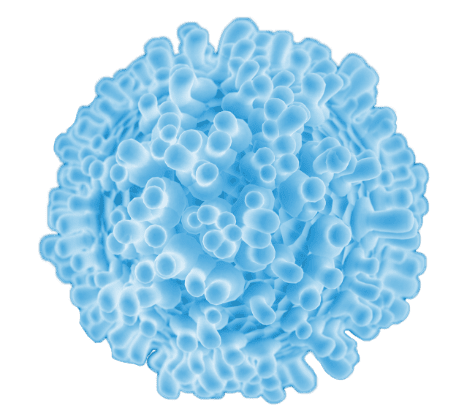OUR SCIENCE
THE TARGET
The Function of GSK-3β
GSK-3β is an enzyme that regulates a number of intersecting biological pathways that are associated with disease—most notably, cancer. GSK-3β drives tumor progression by promoting cancer cell proliferation, resistance and survival in progressive and metastatic disease. GSK-3β appears to be involved in promoting growth and survival in a number of different cancer types, making it a key target for the development of novel, best-in-class therapeutics such as elraglusib.
GSK-3β Inhibitors in Development
Eli Lilly’s LY2090314: a potent, selective small-molecule inhibitor of GSK-3β. In a Phase 1 study, LY2090314 did not demonstrate sufficient activity, and patients suffered treatment-related adverse effects.
Tideglusib: an irreversible inhibitor of GSK-3β that does not compete with adenosine triphosphate (ATP). While tideglusib showed a favorable tolerability profile in a Phase 2 study, patients also experienced side effects like diarrhea and dose-dependent, asymptomatic markers of liver toxicity.



Enter Elraglusib
Elraglusib targets GSK-3β with only minimal side effects.
As a regulator of tumor signaling and antitumor immune response, there is enormous potential to develop elraglusib for the treatment of many different types of cancer.
Elraglusib targets cancer through a multi-pronged mechanism of action that involves multiple cell types known to drive tumor growth. Data to date have shown that elraglusib:
- Downregulates credentialed pathways that lead to chemotherapy and drug resistance, including the nuclear factor κB (NF-κB) pathway and DNA damage response mediated through ATR/Chk1
- Modulates systemic and local cytokine expression
- Offers immunomodulatory effects through regulation of PD-1, LAG-3, and PD-L1 expression, enhancement of checkpoint inhibitor anti-tumor activity, and expansion and activation of both T-cell and natural killer (NK)–cell populations
- May promote tumor-specific adaptive immune responses via modulation of TCR repertoires and expression of MHC
Elraglusib has demonstrated extensive preclinical activity from multiple laboratories and clinical evidence of antitumor activity in multiple cancer histologies. Objective clinical responses and disease control have been observed in clinical studies of elraglusib across a broad range of tumor types. We believe that elraglusib is the first clinically actionable GSK-3β inhibitor to be developed in oncology based on extensive preclinical evidence of antitumor activity and clinical data to date.
If proven to be effective, elraglusib may improve tumor response in tumors that were previously resistant when used in combination with chemotherapy, may improve overall survival, and will be well-tolerated and not lead to immunosuppression or side effects typically associated with other cancer drugs.
Elraglusib will soon be available in an oral formulation, which will create additional advantages for patients, such as:
- Expansion into pediatric cancer indications and adult indications where the standard of care is an oral treatment
- Ease of use and accessibility that will lead to higher compliance and less patient burden
- Ease of maintenance therapy, if indicated
- Reduced manufacturing costs at a commercial scale
Clinical Trials
If you or a loved one are living with cancer, and you’re interested in learning about clinical trials we currently have open, click below to learn more.


PARTNERING
As we continue to develop novel therapies to improve outcomes for patients. We are open to new partnerships with academic and scientific organizations.
